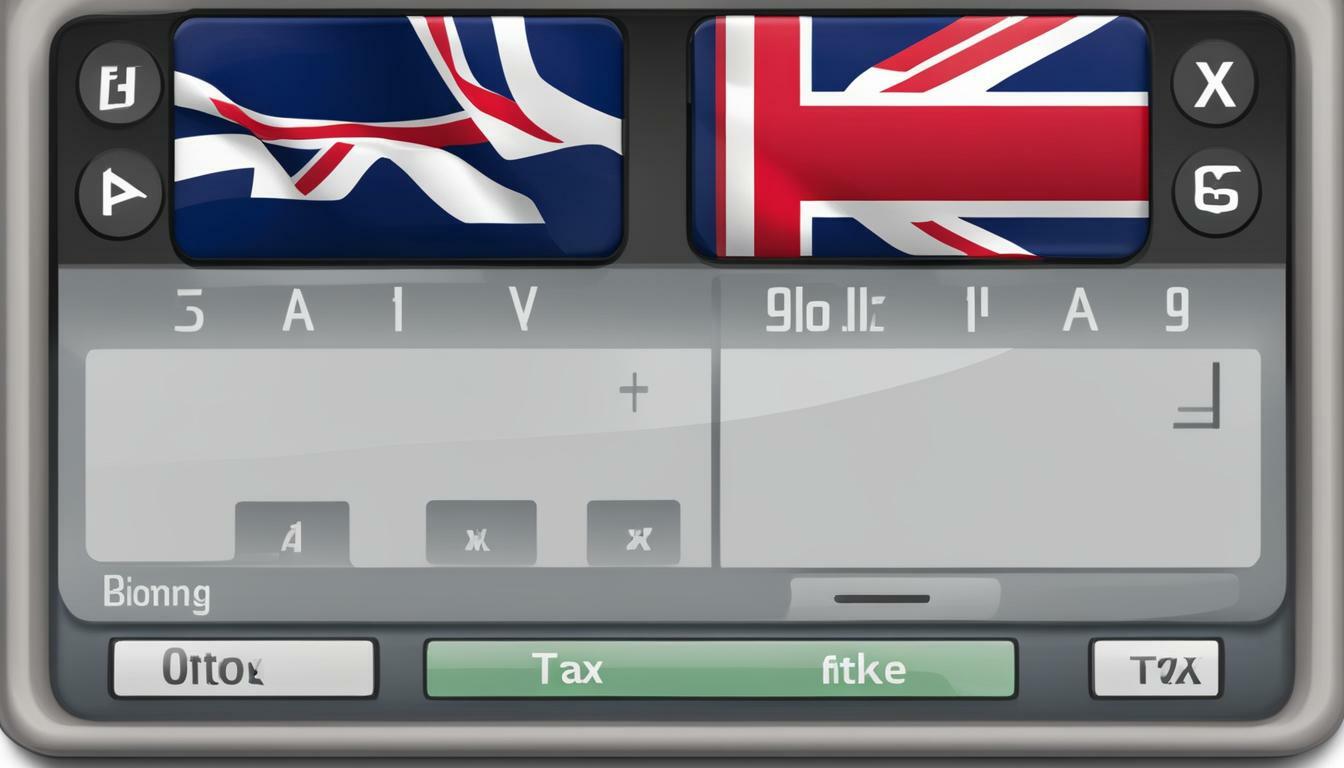As a contractor in the UK, it’s essential to understand how much tax you are required to pay. Moreover, how to calculate your tax obligations accurately. Whether you operate as a sole proprietor or a limited liability corporation (LLC), your tax obligations will vary. To ensure proper compliance and maximize tax savings. It’s crucial to have a clear understanding of the tax rates, deductions, and resources available to you.
Key Takeaways:
- Contractors in the UK have tax obligations based on their business structure, whether sole proprietorship or LLC.
- Both sole proprietors and LLCs pay local taxes, state income taxes, and federal income taxes.
- As a contractor, you are responsible for paying the full amount of Social Security and Medicare taxes through self-employment tax.
- You must file a Schedule C (Form 1040) to report your business income and expenses.
- As a self-employed individual, you can deduct certain business expenses from your taxable income.
- Quarterly estimated tax payments are required if you expect to owe more than $1,000 in annual taxes.
- An annual tax return must be filed by April 15 of the following year, regardless of your net profit.
Working with an accountant can help you navigate the complexities of contractor taxes and maximize your tax savings by understanding the tax rates, deductions, and deadlines. You can ensure proper compliance and optimize your financial situation as a UK contractor.
Table of Contents
Tax Obligations for UK Contractors
UK contractors have specific tax obligations, including income tax payments and self-employed tax requirements that depend on their business structure. As a contractor, whether you operate as a sole proprietor or a limited liability corporation (LLC). You will need to navigate the intricacies of the UK tax system to ensure compliance.
Income tax is one of the primary taxes that pay as a contractor. The amount of income tax you owe will depend on your annual earnings. In addition to income tax, contractors are also subject to self-employed tax. Unlike traditional employees who have Social Security and Medicare taxes split with their employers. Contractors are responsible for paying the full amount of these taxes through self-employment tax.
It is essential to keep accurate records of your business income and expenses to report them properly. Contractors can deduct certain business expenses from their taxable income. These deductions can be advertising and marketing costs, business travel, and home office expenses. The deductions can help reduce your overall tax liability.
Furthermore, must make quarterly estimated tax pay by the contractor. if they expect to owe more than $1,000 in annual taxes. These payments are typically made throughout the year and can help prevent underpayment penalties. Additionally, contractors must file an annual tax return by April 15 of the following year, even if their net profit is less than $400.
Working with an accountant who specializes in contractor taxes is recommended. These ensure you are taking advantage of all available tax write-offs and properly calculating your taxable income. By understanding and fulfilling your tax obligations as a UK contractor, you can maintain compliance and optimize your tax situation.
Understanding Tax Deductions for UK Contractors
UK contractors can take advantage of various tax deductions and allowances. These advantages minimize their tax liability and maximize their take-home income. These deductions and allowances are designed to provide financial relief for legitimate business expenses incurred while running your contracting business. Here are some key deductions and allowances that contractors should be aware of:
1. Business Expenses:
- Advertising and marketing costs: Expenses related to promoting your contracting services can be deducted, including website development, online ads, and business cards.
- Business travel: If you need to travel for work purposes, expenses such as transportation, accommodation, and meals can be deducted.
- Home office expenses: If you work from home, you can deduct a portion of your utility bills. The deductions can be rent or mortgage interest, and other related costs.
2. Contractor-Specific Allowances:
- Flat Rate VAT Scheme: This scheme allows eligible contractors to pay a fixed percentage of their VAT-inclusive turnover to HM Revenue and Customs (HMRC), making VAT administration easier and potentially resulting in lower tax payments.
- Annual Investment Allowance: Contractors can deduct the full cost of qualifying capital expenditure, such as tools and equipment, up to a certain limit.
3. Pension Contributions:
Contributing to a pension scheme is not only a great way to save for retirement but also offers tax benefits. Contractors can make contributions to a personal pension plan and claim tax relief on those contributions, effectively reducing their taxable income.
Remember, to ensure you are taking advantage of all available tax deductions and allowances, it’s important to work with an experienced accountant who can guide you through the process and ensure compliance with all tax regulations. By strategically utilizing these deductions and allowances, you can optimize your tax position as a UK contractor and keep more of your hard-earned income in your pocket.
Calculating and Paying Taxes as a UK Contractor
Calculating and tax pay by the contractor. in the UK requires careful record-keeping and understanding the specific deadlines for filing tax returns and making estimated tax payments. As a contractor, it’s important to stay organized and keep track of your business income and expenses throughout the year.
One helpful tool for managing your tax obligations is a UK contractor tax calculator. These online calculators can help you estimate your tax liability based on your business income, allowable deductions, and other factors. By inputting the necessary information, you can understand how much you will owe in taxes and plan accordingly.
Understanding the deadlines
- For tax returns, the deadline for filing is usually January 31st following the end of the tax year. However, it’s crucial to check the specific deadlines for your situation, as they may vary.
- For estimated tax payments, contractors are generally required to make quarterly payments by the following dates: January 31st, April 30th, July 31st, and October 31st. These payments help you stay current with your tax obligations and avoid any penalties or interest charges.
Working with an accountant can be invaluable when it comes to calculating and paying taxes as a UK contractor. They can ensure that you are taking advantage of all the available tax deductions and allowances, maximizing your tax savings, and minimizing your tax liability. Additionally, an accountant can help you navigate the complexities of the tax system, ensuring compliance with all the necessary regulations.
By keeping accurate records, utilizing a UK contractor tax calculator, and working with an accountant, you can confidently manage your tax obligations as a contractor in the UK. Understanding the deadlines for filing tax returns and making estimated tax pay by the contractor. is essential to avoid penalties or interest charges. Stay informed and proactive to ensure a smooth and compliant tax filing process.
Conclusion
Understanding and managing your tax obligations as a contractor in the UK is crucial to avoid any penalties or overpayment of taxes. Working with a qualified accountant can help you navigate the complexities of contractor taxation and ensure you make the most of available tax deductions and allowances.
As a contractor, whether you operate as a sole proprietor or an LLC, you will have to pay local taxes, state income taxes, and federal income taxes. However, there are some differences compared to being a full-time employee.
One key difference is that as a contractor, you are responsible for paying the full amount of Social Security and Medicare taxes through a self-employment tax, unlike employees who split this cost with their employers.
You will also need to file a Schedule C (Form 1040) to report your business income and expenses. This allows you to deduct certain business expenses, such as advertising and marketing costs, business travel, and home office expenses, from your taxable income.
In addition, if you expect to owe more than $1,000 in annual taxes, you will need to make quarterly estimated tax payments throughout the year. And even if you make less than $400 in net profit, you still need to file an annual tax return by April 15 of the following year.
To ensure you are maximizing your tax savings and taking advantage of all available deductions and allowances, it is highly recommended to work with an accountant who specializes in contractor taxation. They can help you stay compliant with tax regulations, minimize your tax liability, and keep your finances in order.
FAQ
What tax obligations do UK contractors have?
UK contractors have tax obligations that include paying local taxes, state income taxes, and federal income taxes. They are also responsible for paying for their own Social Security and Medicare taxes through a self-employment tax.
Do UK contractors need to file a specific form for their business income and expenses?
Yes, UK contractors need to file a Schedule C (Form 1040) to report their business income and expenses.
Can UK contractors deduct business expenses from their taxable income?
Yes, UK contractors can deduct certain business expenses from their taxable income, such as advertising and marketing costs, business travel, and home office expenses.
Do UK contractors need to make quarterly estimated tax payments?
Yes, UK contractors need to make quarterly estimated tax payments throughout the year if they expect to owe more than $1,000 in annual taxes.
When do UK contractors need to file their annual tax return?
UK contractors need to file their annual tax return by April 15 of the following year, even if they make less than $400 in net profit.




